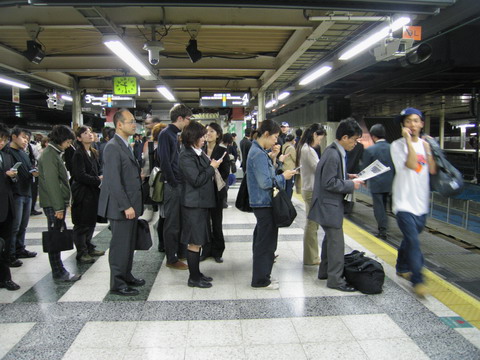Why is Japan so obsessed with punctuality?
Japan is renowned as a nation steeped in its own unique rituals, quirks and customs
There was an “incident” this week on a Japanese train. It was described by a rail company spokesperson as “truly inexcusable”, prompted a flurry of high-level apologies and staff are now being trained to prevent it from happening again.The misdemeanor in question? The train departed from a station 25 seconds ahead of schedule.
The very notion of an “early” train – as opposed to an eternally delayed one (never mind the fact it is worthy of an apology) – is no doubt an alien concept for UK’s long-suffering National Rail season ticket holders.

Yet the incident casts a sharp light on one of the most famed preoccupations of Japanese society – its longstanding obsession with punctuality, right down to the second.
Japan is renowned as a nation steeped in its own unique rituals, quirks and customs – from the two-handed-bowing-head manouevre while exchanging business cards and the strict rules that govern where you can wear shoes or how to have a bath, to passengers not being allowed to open or close taxi doors (because that’s the driver’s job).But one particularly baffling element of Japanese life is society’s meticulous and painstaking attention to punctuality – as embodied by the nation’s entire transport system, which is so punctual you can normally tell the time by its arrivals and departures.
Late trains are so unusual in Japan that when schedules are on rare occasions delayed, there is normally an immediate assumption that there has either been an earthquake or a suicide on the tracks.Not to forget the fact that rail officials then diligently hand out apologetic “late notes” to delayed commuters, so they can give them to their bosses to explain their tardiness.
But it seems that early trains are equally worthy of an apology. The recent “early” train scandal unfolded when a 7.12am train at Notogawa Station in central Japan departed at 7.11am and 35 seconds.A very serious sounding internal investigation by West Japan Railway Company concluded that the train conductor had misunderstood the departure time and closed the doors prematurely. While the incident had no impact on other travel schedules, one passenger complained after missing the train.Perhaps even more surprising is the fact that this was not an isolated incident: last autumn, another rail company in Japan publicly apologised after a train left a station 20 seconds early.
It is difficult to overestimate the importance of punctuality in Japanese society – a quality that perfectly complements a raft of other national characteristics such as “hard-working”, “disciplined” and “respectfully orderly”.
Japanese children are drilled in the utmost importance of punctuality from a young age at school, while many office workers will arrive at work extra early on a daily basis in order to avoid potential tardiness.
The curious phrases that explain the soul of Japan
Japan excels not only at sushi and minimal design – it is also home to countless unusual words that defy succinct translation, both linguistically and conceptually (a personal favourite? “tsundoku”, a word likely to make Marie Kondo’s head spin, which refers to someone – such as myself – who has a permanent pile of unread books lying by their bed).
But perhaps one phrase that best sums up the Japanese spirit is “ganbatte!” (with obligatory exclamation mark). Loosely translated as anything from “do your best!” and “stick with it!” to “be strong!” and “hang in there!”, it is something of a national mantra. It reflects the utmost importance Japan places on doing your absolute best – not for your egotistical self, but for the wider good of the collective community – be it in the context of the aftermath of a devastating tsunami and earthquake (it was heard and seen everywhere after the 2011 disaster), before an important exam or interview – or simply when carrying heavy supermarket shopping bags home (my kids frequently shout it at me when I’m cycling them up a steep hill on our way home on the electric mama chari bicycle).
In terms of other apt phrases, I think it’s a close call between “shinrin yoku” – which means forest bathing and sums up Japan’s deep-rooted spiritual and cultural respect for all things nature-related – and “karoshi”, a word meaning “death from overwork” which the government was forced to invent to describe the growing number of fatalities due to insanely long work hours. The key to Japan’s psyche can probably be found hovering somewhere between these two extremes.
Danielle Demetriou, the telegraph
